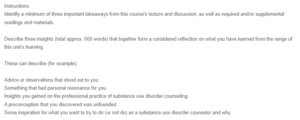A Course Self-Reflection – ADC215: Physiology of Substance Abuse
The ADC215: Physiology of Substance Abuse course has been a great addition to my academic growth and skills development in preparation for future professional practice. Notably, there are several takeaways and insights that I have on substance abuse so far. The three important takeaways from this course include 1) substance abuse affects how the brain’s rewards system operates, 2) substance abuse is a risk factor for multiple diseases and conditions, and 3) substance abuse is manageable and treatable. Firstly, I have learned that naturally, the brain’s reward system can regulate the production of dopamine, the neurotransmitter that makes the individual experience pleasure and motivation. In this state, the brain’s rewards system operates in a way that is considerably normal. However, when the individual starts to use and continues to abuse substances, the brain is unable to regulate the production of dopamine; hence, the individual experiences heightened levels of pleasure. This disrupts the brain’s rewards system, pushing the individual to continue abusing such drugs and substances in order to maintain such heightened feelings of pleasure, leading to addiction.
Secondly, the continued use of drugs and substances, besides creating addictions, increases the risk of developing various health problems in several ways. For example, continued use of alcohol risks liver issues, tobacco smoking increases the risk of various types of cancer, and drugs generally weaken the immune system. Additionally, the risk of exposure to diseases, especially STIs, is high due to substance use in relation to uncontrolled behaviours and sharing of syringes. Despite all these, substance abuse is not a lifetime problem; it can be effectively managed and treated. There are multiple pharmacological and non-pharmacological approaches that can help people recover from substance and drug addictions and have their normal lives back.
Besides these takeaways, I have gained great insights regarding substance abuse from the range of the ADC215: Physiology of Substance Abuse course unit’s learning. For instance, I previously had the preconception that addiction to substances was just simple behaviour that an individual got on and could easily get off. However, the knowledge of substance abuse and the processes that lead to substance and drug abuse and addiction have made me understand and appreciate it is a complex disorder. It is not just a choice that people can easily make to get out of. A majority of people with drug and substance abuse addiction are struggling with a mental health problem that requires a lot of attention and treatment. Another insight I have gained is that substance abuse does not result from just continued drug and substance use. Rather, it results from multiple factors, including environmental, genetic, and psychological factors, that interact at different levels.
These takeaways and the newly gained insights on substance abuse have also helped me develop new perspectives toward the professional practice of substance use disorder counselling. The knowledge that substance abuse is a dual disorder with complex causal factors helps me to be able to plan counselling and treatment in a way that creates a supportive and comfortable environment where the patient can be free to express themselves and recover at their own phase. In addition, the knowledge that recovery or cessation of certain addictions and behaviours, such as cigarette smoking, is affected by socioeconomic background and the use of other substances, such as alcohol (West et al., 2020), will help me plan counselling and plan for recovery in a way that considers and integrates the client’s individual factors, socioeconomic background, and their current environment. Therefore, the course has helped me understand that a tailored approach to individual client situations is needed in the management of patients with substance abuse and related health problems. Overall, the ADC215: Physiology of Substance Abuse course has contributed to my understanding of substance abuse, cleared my preconceptions, and given me new insights into practice approaches as a counsellor focused on substance abuse.
References
West, J. C., Peasley-Miklus, C., Graham, A. L., Mays, D., Mermelstein, R., Higgins, S. T., & Villanti, A. C. (2020). Impact of alcohol and drug use on smoking and cessation in socioeconomically disadvantaged young adults. Addictive Behaviors, 110, 106486. https://doi.org/10.1016/J.ADDBEH.2020.106486
ORDER A PLAGIARISM-FREE PAPER HERE
We’ll write everything from scratch
Question

Physiology of Substance Abuse
Instructions
Identify a minimum of three important takeaways from this course’s lecture and discussion, as well as required and/or supplemental readings and materials.
Describe three insights (total approx. 600 words) that together form a considered reflection on what you have learned from the range of this unit’s learning.
These can describe (for example):
Advice or observations that stood out to you.
Something that had personal resonance for you.
Insights you gained on the professional practice of substance use disorder counselling.
A preconception that you discovered was unfounded.
Some inspiration for what you want to try to do (or not do) as a substance use disorder counsellor and why.


